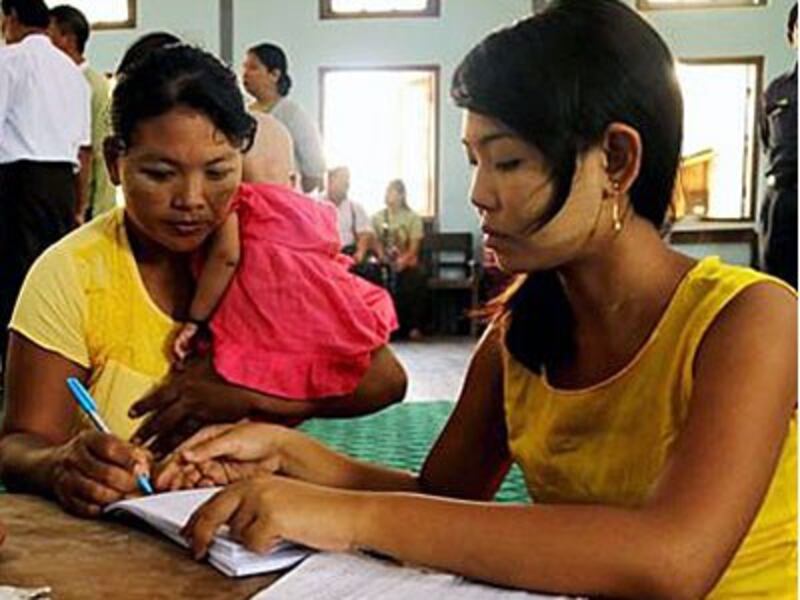UPDATED at 12:40 P.M. on 2017-06-13
About 200 Myanmar police officers and 1,000 hired hands on Monday dismantled 4,000 squatters’ homes and arrested five residents in a township in the commercial capital Yangon under orders from the regional government to clear the area for a high-rise residential project, local officials said.
Authorities forcefully tore down the shanty town in Hlegu township along an expressway 48 kilometers (30 miles) northeast of Yangon in the first forced evictions under the civilian-led government of de facto national leader Aung San Suu Kyi, which has been in power since April 2016.
Forced evictions were common in the five decades Myanmar was under military rule.
Police arrested four men and one woman who tried to block the road and attacked them with slingshots, sources said. They are being held at Hlegu police station.
“Nobody had given them official permits to live here,” said Yu Khine, director of Yangon’s Planning and Housing Department. “We’ll try our best to carry out the removal of the houses in accordance with our laws and minimize their losses.”
“We have given them time to get their belongings and also formed a board to hear their complaints,” he said. “We’ll explain the actions and help them move their belongings, too, if they have difficulties.”
Yu Khaing, the director general of the Housing Department, told the online journal The Irrawaddy that the area is owned by the government and scheduled for development by his department and the Ministry of Construction.
The owners of the houses said they paid 300,000 to 1,300,000 kyats (U.S. $218-$947) for each of their 40-by-60 square-foot plots and want the police to take action against the sellers.
“We want effective action against these people who sold us the plots," homeowner San San Htay told RFA’s Myanmar Service, adding that he has documents showing that village officials Pyone Cho and Kyi Lwin sold him his plot of land for 1.8 million kyats (U.S. $1,311).
“Effective action is needed so they cannot commit this kind of fraud with others,” he said.
“These people will keep on cheating poor people if they can,” he said.
Homeowner Thida Oo, who said she paid a “nice sum” for a plot of land she bought in May, criticized authorities for accusing her and others who paid for their land of being squatters.
“We are rural people, and we don’t cheat others or commit unjust deeds,” she said.
Hla Hla Htay, a homeowner who moved to Hlegu from the town of Pakokku in central Myanmar’s Magway region, said she paid 2.7 million kyats (U.S. $1,966) for her house.
“I bought this plot with all my savings and haven’t even have settled the moving expenses yet,” she said. “They [authorities] said they would get the land grants soon, which they are still in the process of doing.”
“I told them I’d dismantle my house myself so I could retrieve some parts, but they wouldn’t let me do that,” she said.
The Yangon government intends to clear the illegal houses within two months without using bulldozers in order to build a world-class residential project.
Authorities gave the residents official notice in August 2016 that they were living in the area illegally and issued them reminders almost every month thereafter.
During the past two months, about 1,000 more houses have been set up, according to local media.
The demolition operation marked the second time that squatters have been cleared out of Hlegu township following the leveling of the area in 2015.

Bahan residents deemed squatters
In a related development, authorities issued documents to more than 400 families from three wards in central Yagon’s Bahan township declaring them illegal squatters.
Most people refused to accept the papers, arguing that they had lived in the area for more than a century and are permanent residents.
Homeowner Ohn Myint said her family had lived on the land since her grandparents’ time.
“My mother had been here since she was seven years old, and I was born when she was 20,” she said. “I am now 84 years old. That means we’ve been here for over a century.”
Khin Sein, a 64-year-old lifelong resident of the area, said people who have lived in there since their grandparents’ time cannot accept the term ‘squatters.’
“We are not illegals,” she said. “Even though we don’t have documents, we have lived here—altogether 14 households in the beginning—with the permission of the landlord.”
Homeowners pointed out that some of the houses in the area are solidly built with brick and mortar rather than flimsy structures in which squatters usually live.
The current owner of the land, Chan Kyaw Paing, is the great-grandson of Po Tha, a wealthy rice merchant during Myanmar’s colonial era.
Mu Mu Mar, a government official said Chan Kyaw Kyaw Paing had not charged the residents any rent or fees.
“He has just let them live on his land from the get-go, so we can say they are living here illegally,” he said.
Ohn Kyaing, chairman of Nga Htat Gyi ward, said local authorities are conducting a survey of the residents under orders of the regional government.
“The landlord himself came to see us and to see the homeowners and told them not to worry,” he told RFA. “He said he would take full responsibility.”
Chan Kyaw Kyaw Paing did not elaborate on the situation.
“All these people are like family to me,” he told RFA. “I will try to solve the problem.”
Reported by Kaung Htet Kway, Htet Arkar, Aung Thein Kha, Thant Zin Aung for RFA’s Myanmar Service. Translated by Khin Maung Nyane. Written in English by Roseanne Gerin.
CORRECTION: An earlier version of the story erroneously stated that six people — five men and one woman—had been arrested instead of five people, including four men and one woman.
